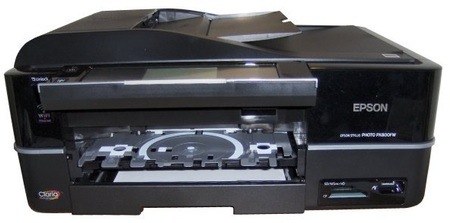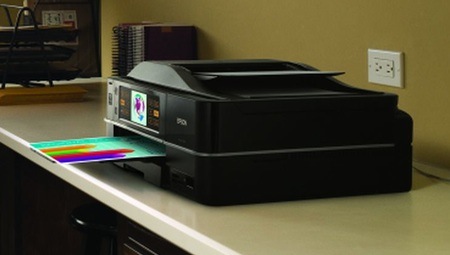This article is more than 1 year old
Epson Stylus Photo PX800FW all-in-one wireless printer
Epson tries to keep up with the competition
Since time immemorial Epson printers have fed paper from a near-vertical bay at the rear to a pull-out trays at the front, so it's a mark of the degree of rethinking that's gone into this machine that it has a paper cassette, taking up to 120 sheets of A4 paper, which slides in at the front. Built into Epson's tray is a separate holder for up to 20 sheets of 15 x 10cm glossy photo paper.

Disc printing's built in
To the right of the paper cassette are memory card slots for all the current types - some formats require an adaptor, though Epson doesn't include one - together with a PictBridge socket. At the back, you'll find USB 2.0 and Ethernet ports, but the machine is also equipped for wireless networking, with 802.11b/g Wi-Fi built-in.
Wireless setup isn't as simple as it should be, as you have to temporarily cable the machine to a router, rather than just doing a wireless search and selecting the right network from the control panel. Other machines work this way and it's a lot more straightforward than the system Epson imposes on you here.
It won't surprise you to learn there's no Ethernet cable bundled, and no USB cord either.
Setting up the printer and, later, replacing the ink cartridges is simply a question of lifting the scanner section to get at the print head hod and pressing each of the six ink tanks into place. The printer runs a one-time priming cycle and you’re then ready to go.
Epson claims the PX800FW can pump out both colour and monochrome prints at 40ppm, but you won’t see anything like this in normal use. To be fair, Epson adds the proviso that its speeds are measured in draft mode and do not include processing time, but this just makes them pretty useless at showing what you’ll get on a day-to-day basis.

Six-colour printing
We printed a five-page text document using only black ink - it took 45 seconds. A 20-page document took 2m 35s, giving more realistic speeds of 6.7ppm and 7.7ppm, less than a fifth of the claimed figures. Even so, they’re not at all bad for an inkjet printer, even a high-end one costing around £300. What's even better, is the speed this machine produces photos.
